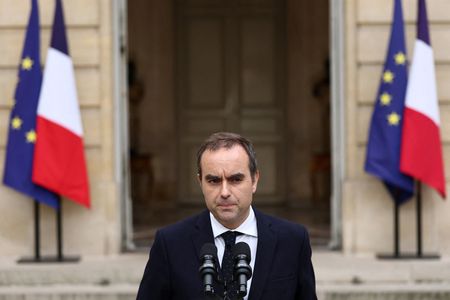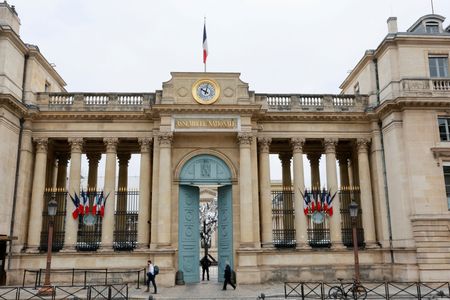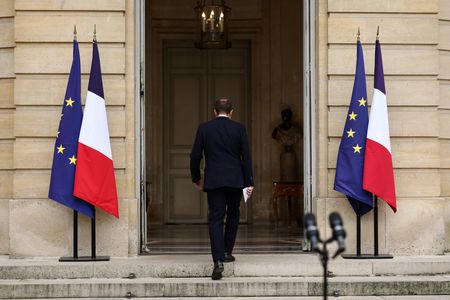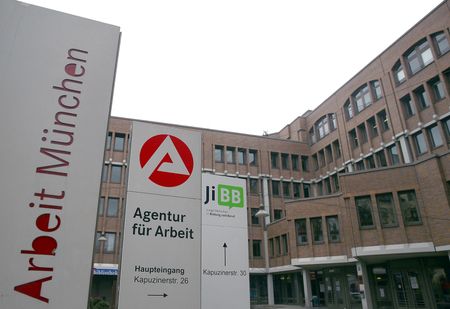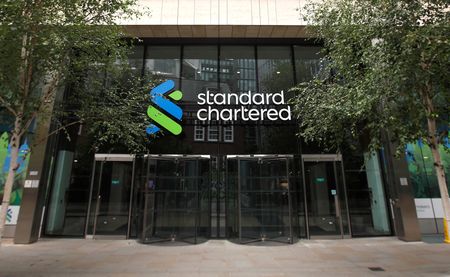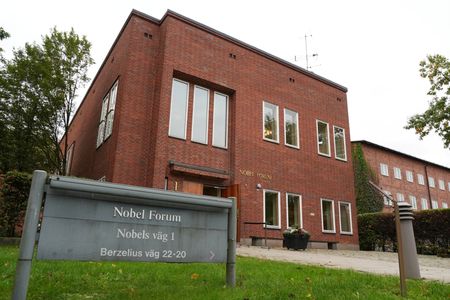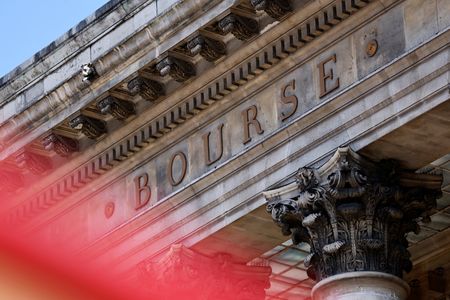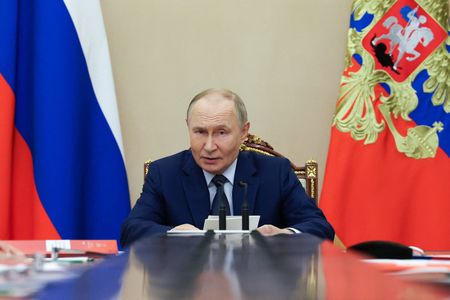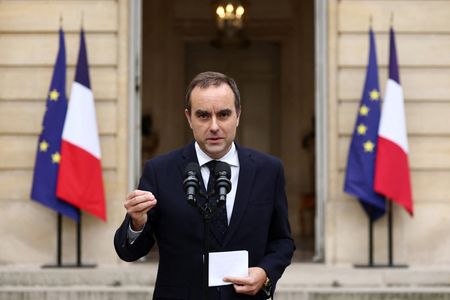By Michel Rose, Elizabeth Pineau and Benoit Van Overstraeten
PARIS (Reuters) -France’s new Prime Minister Sebastien Lecornu and his government resigned on Monday, hours after Lecornu announced his cabinet line-up, in a major deepening of France’s political crisis that drove stocks and the euro sharply lower.
The swift, unexpected resignation came after allies and foes alike threatened to topple the new government.
The far-right National Rally immediately urged President Emmanuel Macron to call a snap parliamentary election. The hard left France Unbowed said Macron himself must go.
Lecornu, who was Macron’s fifth prime minister in two years, stayed in the job for only 27 days. His government lasted 14 hours, making it the shortest-lived in modern French history at a time when parliament is deeply divided and the euro zone’s second-largest economy is struggling to put its finances in order.
LECORNU BLAMES PARTIES’ STUBBORNNESS
“One cannot be prime minister when the conditions are not met,” Lecornu said in a short speech after his resignation.
To explain why he could not go forward and strike compromises with rival parties, he blamed the “egos” of opposition politicians who rigidly stuck to their manifestos, while those inside his minority coalition were focusing on their own presidential ambitions.
“You should always prefer your country to your party,” he said.
NEW CABINET LINE-UP ANGERED OPPONENTS
After weeks of consultations with political parties across the board, Lecornu, a close ally of Macron, had appointed his ministers on Sunday and they had been set to hold their first meeting on Monday afternoon.
But the new cabinet line-up had angered opponents and allies alike, who either found it too right-wing or not sufficiently so, raising questions on how long it could last, with no group holding a majority in a fragmented parliament.
Lecornu handed his resignation to Macron on Monday morning.
“Mr. Sebastien Lecornu has submitted the resignation of his Government to the President of the Republic, who has accepted it,” the Elysee’s press office said.
French politics has become increasingly unstable since Macron’s re-election in 2022 for want of any party or grouping holding a parliamentary majority.
OPPOSITION WANTS SNAP ELECTIONS
Macron’s decision to call a snap parliamentary election last year deepened the crisis by producing an even more fragmented parliament.
But France could now possibly be headed for another snap parliamentary vote.
“I call on the President of the Republic to dissolve the National Assembly … this joke has gone on long enough, the farce must end,” National Rally chief Marine Le Pen said after Lecornu resigned.
Mathilde Panot, of the hard left France Unbowed, said: “Lecornu resigns. 3 Prime Ministers defeated in less than a year. The countdown has begun. Macron must go.”
FRENCH STOCKS AND EURO FALL
Paris’ CAC 40 dropped 2%, on track for the biggest one-day drop since August, making it the worst-performing index in Europe, as banking shares came under heavy fire.
The euro slid 0.7% on the day to $1.1665.
Lecornu’s two predecessors, Francois Bayrou and Michel Barnier, were brought down by parliament over efforts to rein in France’s public spending at a time when ratings agencies and investors are watching closely.
France’s debt has risen to 113.9% of gross domestic product, while the deficit was nearly double the European Union’s 3% limit last year
“It’s just one government after another … this is the major problem for French assets, but it has a spillover effect for the rest of Europe,” said Chris Beauchamp, chief market analyst at IG Group.
DEEP INSTABILITY
France has rarely suffered a political crisis so deep since the creation in 1958 of the Fifth Republic, the current system of government.
The 1958 constitution was designed to ensure stable governance by creating a powerful and highly centralised president endowed with a strong majority in parliament, and to avoid the instability of the periods immediately before and after World War Two.
Instead, Macron – who in his ascent to power in 2017 reshaped the political landscape – has found himself struggling with a fragmented parliament where the centre no longer holds the balance and the far-right and hard-left hold sway.
France is not used to building coalitions and finding consensus.
(Writing by Ingrid Melander; Reporting by Elizabeth Pineau, Benoit Van Overstraeten, Michel Rose, Sudip Kar-Gupta, Inti Landauro, Alessandro Parodi; Editing by Gareth Jones)

